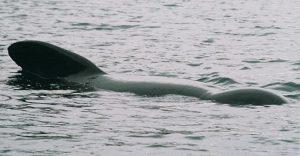In a deeply controversial event drawing international condemnation, pregnant pilot whales and their calves were killed during the latest annual hunt in the Faroe Islands, according to the Sea Shepherd Conservation Society. The organization, known for its marine wildlife activism, has reported that the traditional hunt-locally known as the grindadráp-resulted in significant losses to vulnerable whale populations, sparking renewed calls for the practice to be abolished. This development raises urgent questions about the sustainability and ethics of the centuries-old hunt, which continues to attract global scrutiny despite mounting opposition.
Pregnant Pilot Whales and Calves Targeted in Controversial Faroe Islands Hunt
Recent reports from the Faroe Islands reveal a disturbing escalation in the annual pilot whale hunt, where pregnant females and calves have been disproportionately affected. Conservationists highlight that the brutal slaughter not only threatens the immediate population but also jeopardizes the future generations of these intelligent marine mammals. Evidence collected by Sea Shepherd crews shows that entire pod families, including vulnerable young whales and expectant mothers, are being driven to shorelines and killed in what critics describe as an obsolete and inhumane practice.
This controversial hunt has ignited global outrage, with activists demanding an urgent reassessment of the tradition amid mounting ecological concerns. The methodical targeting patterns raise significant ethical questions, further intensified by data pointing to a high mortality rate among calves. The table below outlines key figures from recent years, illustrating the scale and demographic impact of the hunts:
| Year | Total Whales Killed | Calves | Pregnant Females |
|---|---|---|---|
| 2021 | 675 | 180 | 25 |
| 2022 | 688 | 195 | 28 |
| 2023 | 702 | 210 | 32 |
- Conservationists: Call for a global ban on the hunt to protect endangered populations.
- Local authorities: Defend the practice as cultural heritage and sustainable management.
- Sea Shepherd: Pledges increased monitoring and intervention efforts in upcoming seasons.
Sea Shepherd Conservation Society Condemns the Mass Slaughter and Calls for Immediate Ban
The Sea Shepherd Conservation Society has issued a strong condemnation following the recent reports of pregnant pilot whales and their calves being slaughtered during the annual hunt in the Faroe Islands. Describing the event as a “brutal and unnecessary massacre,” the organization calls on local authorities and governments worldwide to take immediate action to halt this cruel practice. Witnesses and footage reveal distressing scenes that highlight the devastating impact on the marine ecosystem and underline the urgent need for protective legislation.
Sea Shepherd’s statement emphasized key demands aimed at protecting pilot whales and preserving marine biodiversity:
- Immediate ban on all lethal hunting methods targeting cetaceans in the region.
- Strict enforcement of international marine conservation laws and penalties for violations.
- Investment in alternative, sustainable economic activities for the local communities involved.
- Global awareness campaigns to promote non-violent coexistence with ocean wildlife.
| Incident | Date | Estimated Whales Slaughtered | Pregnant Females Confirmed |
|---|---|---|---|
| 2024 Annual Hunt | May 2024 | 142 | 12 |
Experts Urge International Intervention and Implementation of Stricter Marine Mammal Protections
Marine biologists and conservationists worldwide have expressed outrage over the recent killings of pregnant pilot whales and their calves in the Faroe Islands’ traditional hunt. Experts emphasize that the practice not only threatens population sustainability but also disrupts the ecological balance of marine environments. Highlighting mounting evidence, they call for immediate intervention by international bodies to enforce stricter regulations and end such hunts that cause indiscriminate harm, especially to vulnerable groups like mothers and newborns.
Leading organizations recommend a comprehensive approach that includes:
- Legally binding international agreements to phase out pilot whale hunting
- Enhanced monitoring and reporting mechanisms to ensure transparency in marine mammal harvesting
- Greater funding for marine conservation programs supporting sustainable marine ecosystems
- Community engagement and education to promote alternative livelihoods and respect for marine life
| Key Recommendation | Expected Impact |
|---|---|
| International Moratorium | Population recovery and reduced mortality rates |
| Stricter Monitoring | Accountability and data-driven protection measures |
| Community Programs | Socioeconomic alternatives and reduced hunting pressure |
Insights and Conclusions
The recent events in the Faroe Islands have once again brought international attention to the controversial practice of pilot whale hunting. With pregnant females and calves among those slaughtered, conservation groups like the Sea Shepherd Conservation Society continue to call for an end to the hunts, emphasizing the urgent need for more humane and sustainable approaches. As the debate intensifies, the global community watches closely, weighing cultural tradition against animal welfare and environmental conservation.
















